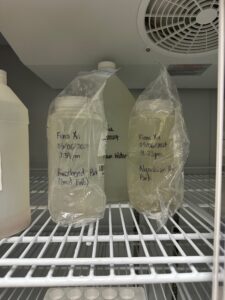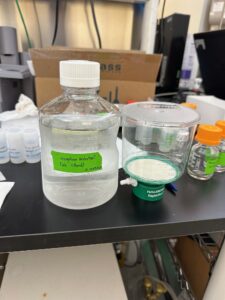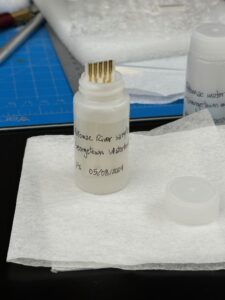Week Ten: When It Rains, It Pours
May 11, 2024
Hi Blog!
It’s been a crazy (in a busy and eventful way) week. Why? Taylor Swift has a new setlist for the European leg of her tour!
I’m just kidding (but in all seriousness, the sentence above is big news). I finally collected water samples from the Potomac River this past weekend, and it was a pretty long process. I originally planned to go out and collect them on Saturday, but it was raining all day, so I couldn’t. I wanted to avoid collecting it on a rainy day because the rainwater forms a layer on top of the river before fully mixing in with its water, so if the origin of the sample doesn’t accurately reflect the rest of the water in the river, the sample won’t either. Ideally, the water sample should be representative of the entire river.
Then, after an entire weekend of gloomy skies and rain, my dad graciously drove me to three different sites on the Potomac River in the DMV on Monday.
-Georgetown Waterfront Park (Georgetown, Washington D.C.)
-Riverbend Park (Great Falls, VA)
-Algonkian Regional Park (Sterling, VA)
First, I collected the sample from Georgetown Waterfront Park, followed by the Riverbend Park, and ended with the Algonkian Regional Park because it’s closest to my home.
One disclaimer I’d also like to point out is that the collection of water samples was not perfect due to resource limitations (i.e. specifics of where you should collect them – I had to collect them from the riverbank instead of from the middle of the river), but I tried my best to mimic the ideal conditions. For example, after I collected each sample, I stored them in a cooler before transferring them to the fridge in the MITRE Bio-Nano lab. They have to be kept in cold temperatures because the cold slows down natural processes that change the water sample’s content, preserving the original composition as much as possible. I’ve included images of both below.


I’ve gotten the samples into the lab, but there’s still one more step. Because the river water has a lot of sediment and bacteria, amongst the other gunk in the water, the water needs filtering, so the sensor doesn’t detect for other things besides PFAS. Thus, my coworkers helped me use vacuum filtration to clean out the water samples. I stored the filtered water in new plastic bottles and relabeled them with the site name, my name, and date. As you can see in the image below, the filter paper was quite dirty.


I unfortunately don’t have a picture of it, but the Algonkian Regional Park sample was especially filthy, as the entire filter paper was a deep brown color with sediment dispersed on throughout it. Now that the water’s been filtered out, I started performing sensing experiments with them; I created PFOS MIPs, so I’m seeing if I can detect PFOS from the samples. This week I started with the Georgetown Waterfront sample (as seen below), and next week I’ll continue with the other two sites. I’ll talk more about the specifics of the experiment in my next post. The data from these experiments is what I’ll analyze and show in my final presentation.

I ended the week by performing a PFBS Water MIP with a 1:1 ratio of o-PD:PFBS. What’s different about this PFBS experiment compared to last week’s is I’m letting the electrode dry for 30 minutes post fabrication and using methanol in the extraction solution instead of acetone. I’m still in the process of completing it, but from the DPVs I’ve seen while characterizing, it seems like the methanol wasn’t strong enough to extract the MIP compared to the acetone.
That’s it for this week and since there’s t-minus two weeks since the Senior Project showcase, I’m going to spend a lot of time working on my paper and presentation between now and then! It’s insane to think that my Senior Project experience is coming to an end.
See you next week for my last blog post (I can’t believe I’m saying that),
Fiona
Citations
Daniels, M., B.J. Austin, and B.E. Haggard. 2017. Collecting Water Samples Is So Easy, Anyone Can Do It!. Arkansas Water Resources Center, Fayetteville, AR, FS-2018-01: 07 pp.
Metzger, M. R. (2014, October 9). Best practices for collecting water samples. Water Technology. https://www.watertechonline.com/home/article/15546332/best-practices-for-collecting-water-samples
All images: Fiona Xu

Leave a Reply
You must be logged in to post a comment.